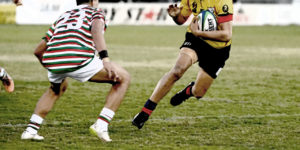Most ruggers have a “fighting weight” at which they feel comfortable and able to play at their best. Going over or under this weight can affect you physically as well as psychologically. For example, if you feel you play your best rugby at 90kg/200lbs., losing weight might make you feel small and weak while gaining weight might make you feel fat or sluggish.
Maintaining your weight in the off-season is relatively straightforward because you have a lot more control over your diet and training. Your schedule is relatively fixed, so you can adapt your workouts and meals to achieve your body composition goals.
Things get much trickier during the competitive season. You’ll be playing more, potentially training less, and may even be on tour and unable to follow your usual dietary regimen. Whether you lose or gain weight depends on several factors, including your genetics, how much more or less you eat, and other factors such as sleep and stress.
Use this information in this article to avoid unwanted body weight fluctuations.
How to avoid gaining weight in the rugby season
Gaining weight in the rugby season is usually down to two factors: not training as much as usual and eating more food. This creates a calorie surplus in which your body converts into stored body fat.
While you don’t need to be ripped to be a successful rugger, too much fat can be a problem. It’s “dead weight,” and while it may make you harder to push off the ball, lugging that extra ballast up and down the rugby field will slow you down and tire you out.
The rugby season is not the time to start trying to lose fat fast by following a strict diet. While that could help you lose weight, you’ll probably lose muscle and strength too. More conservative approaches are best as you not only want to avoid weight gain, you also need to maintain your muscle mass and energy for the next time you need to be out on the rugby field.
Good interventions include:
Walking
A daily walk won’t rob you of valuable energy, interfere with recovery, or otherwise affect your rugby performance. Walking is easy on your joints and doesn’t even count as a workout, but it can still help prevent weight gain.
Commit to walking 10,000 steps per day, which equates to about an hour or four miles for most people. That might sound like a lot but, if you seek out opportunities to walk instead of drive or ride, it’s actually very easy to achieve.
Walk briskly so that you are slightly out of breath but not so fast that you are almost running. Remember, this is meant to be easy!
As well as being a great way to prevent weight gain, walking will also speed up recovery after intense training and ease the aches and pains that accompany a hard game of rugby. And, best of all, you can do it almost anywhere and anytime. Use an activity tracker to record your steps and made sure you hit your 10,000 step target.
Intermittent fasting
In its purest form, intermittent fasting just means skipping a meal or two to reduce your calorie intake. As diets go, it’s arguably the easiest one to follow. Try skipping breakfast a few days a week and making lunch your first meal of the day instead. Providing you don’t overeat when you break your fast, you’ll save yourself a reasonable number of calories, and that will help control your weight.
The main caveat for ruggers contemplating IF is that you should not fast on the day before, the day of, or the day after a game. Those days are nutritionally important, and fasting could undermine your performance. The rest of the week, skipping breakfast will not affect your energy or performance, but should produce easy weight loss or prevent weight gain.
Finishers
A finisher is a mini workout that is bolted on to the end of your regular training session. Usually no longer than 5-10 minutes, finishers are very intense but are over quickly enough that you can still give it 100%.
Finishers increase your calorie expenditure during and after your workout. They increase EPOC, short for post-exercise oxygen consumption, and also known as the afterburn effect. EPOC increases your post-workout metabolic rate – for as long as 36 hours. This can help prevent weight gain.
Examples of finishers include:
- Run one mile as fast as possible
- Row 2,000 meters as fast as possible
- Complete 100 burpees as fast as possible
- Hit a punchbag for five minutes straight
- Run 4 x 400 meters, resting 90 seconds between efforts
- 3 x 3-minutes jump rope, resting one minute between efforts
Avoid too much alcohol and junk food
A lot of post-rugby celebrations involve beer and junk food. Whether you win or lose, a lot of teams end up in the bar after a game. While this is an enjoyable way to wind down, it can lead to unwanted weight gain if you go overboard.
It’s common sense that eating too much junk food and imbibing too much alcohol can lead to weight gain, so you need to take it easy after matchday and during the rest of the week too. The same is true for high-sugar snacks. If you aren’t training as hard, it stands to reason that these extra calories will end up being stored as fat. Adjust your food intake to reflect that fact you are training less.
How to avoid losing weight in the rugby season
Some ruggers lose weight and strength during the rugby season. Playing more and training less means less gym time, and if you are a naturally slender “hard gainer” this can soon lead to lost muscle mass.
It can be hard to build muscle during the rugby season but preserving it much more doable. Effective strategies for avoiding unwanted weight loss include:
Make the switch to full-body workouts
Split routines, where you train each muscle group once per week, can soon fall apart during the playing season. Games and practices may mean you end up skipping a workout or two, and that can leave important muscles untrained.
Full-body workouts mean that, even if you only manage to hit the gym twice a week, each main muscle group will get two workouts. That should be more than enough to maintain both muscle mass and strength.
For example:
| Workout One | Workout Two | |
| 1 | Squats | Deadlifts |
| 2 | Romanian deadlifts | Bulgarian split squats |
| 3 | Bench press | Shoulder press |
| 4 | Bent over rows | Pull-ups |
| 5 | Lateral raises | Dips |
| 6 | Skull crushers | Biceps curls |
| 7 | Hanging knee raises | Ab wheel rollout |
A couple of heavy sets of each exercise, after a warm-up, of course, is all you need to maintain strength and muscle size while leaving plenty of time and energy for recovery. Alternatively, follow our 20-1-20 Total Preparation for Rugby training program, which is built around time-efficient full-body workouts.
Add a power smoothie to your diet
If you want to maintain your muscle mass and weight, you need to make sure your body has all the calories and nutrients it needs. Any shortfall could result in lost size and strength. One of the easiest ways to make sure you eat enough every day is to add a power shake to your diet. Chug one down any time of the day to provide your body with the calories it needs.
PRO TIP: Getting up at 2-3am to consume the protein shake is the best way to fuel your body with nutrients when it needs them.
You can buy “mass gainer” shakes, but most are nothing more than cheap carbs, usually sugar, and low-quality protein. They can also cause gastric distress. Avoid these problems by making your own.
For example:
- 8-ounces almond milk
- 1-2 bananas
- 2 scoops vanilla protein
- 2 tablespoons natural peanut or almond butter
- 1 tablespoon natural honey or maple syrup
Cut down on your cardio
While cardiovascular fitness is essential for successful rugby, it can also be very catabolic and could be a culprit for weight loss. You need cardiovascular fitness, but you don’t need to do hours of cardio training to achieve it, especially during the playing season.
Rugby playing and training should give your cardiovascular system all the stimulus it needs to stay fit and healthy. If you feel like you need more, forget long-distance running and opt for short HIIT or sprint interval training sessions instead. Both of these training methods can preserve muscle mass while building fitness.
Get enough sleep
If you play hard and train hard, you need to sleep hard too. Sleep puts back into your body what intense physical activity takes out. The average adult needs 7-9 hours of sleep per night, and hard-charging ruggers arguably need more. Why? Because we put our bodies through so much more stress. This means we need even more sleep to repair our muscles and restore our energy levels.
Sleep can be hard to come by, especially if you don’t treat it like a priority. It’s all too easy to demote sleep simply because there are more exciting things to do, like finish binge-watching a new show on Netflix.
If you are losing weight and strength, a lack of sleep could be the problem. After all, your body increases both growth hormone and testosterone production during sleep, and they are both vital for muscle growth, repair, and preservation.
Strategies that can increase sleep duration and quality include:
- Go to bed earlier
- No TV, smartphones, laptops, etc., in the bedroom that will distract you from sleeping
- Make sure your mattress and pillows are comfortable and supportive
- Use blackout blinds
- Go to bed and get up at the same time every day
- Avoid caffeine and pre-workout for 3-4 hours before bedtime
Read more about the importance of sleep and how to get more in this article. Consider investing in a comfortable mattress such as these from unclutterer.
The wrap-up
Small weight fluctuations are normal in rugby. Your weight can go up or down by several pounds over a day. This is because your body loses or retains water. However, more significant weight fluctuations are usually the result of changes in body composition. These can have a marked effect on your performance.
While you may benefit from bulking up or getting leaner, the rugby season is not the time to do it. Instead, most players should try and maintain their weight at this critical time. Use these strategies to make sure your weight and playing performance remain stable for the entire season.


